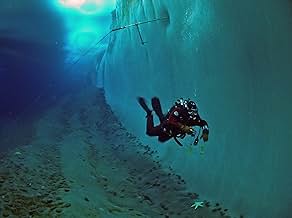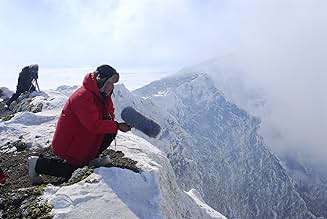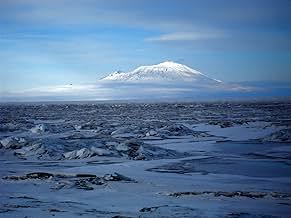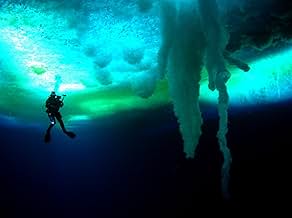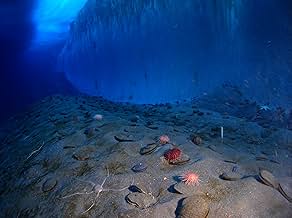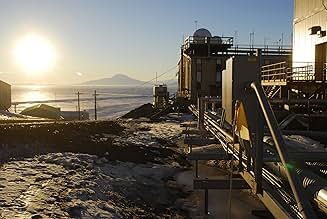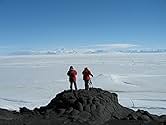Ajouter une intrigue dans votre langueFilm-maker Werner Herzog travels to the McMurdo Station in Antarctica, looking to capture the continent's beauty and investigate the characters living there.Film-maker Werner Herzog travels to the McMurdo Station in Antarctica, looking to capture the continent's beauty and investigate the characters living there.Film-maker Werner Herzog travels to the McMurdo Station in Antarctica, looking to capture the continent's beauty and investigate the characters living there.
- Réalisation
- Scénario
- Casting principal
- Nommé pour 1 Oscar
- 2 victoires et 16 nominations au total
- Self - Glaciologist
- (as Douglas MacAyeal)
- Self - Filmmaker, Cook
- (as Ryan A. Evans)
Avis à la une
It focuses predominantly on the odd collection of people drawn to live in an Antarctic research station, and to a slightly lesser degree on the oddness of the region itself, and the bizarre bits of scientific trivia that can be found there. Then there the bonus meanderings about the ultimate doom of humanity and whether we originally emerged from the sea onto land to escape the "horror" of marine ecosystems.
Many of its parts are fascinating, but for me, it didn't quite come together as a whole. It drifted in a lot of different directions, but seemed overall to be lacking in focus a bit. There were also a couple of elements that disturbed me a little - one was the inconsistency of talking about how humanity is destroying itself one moment, and then bashing "tree huggers and whale huggers" the next. I guess it's OK to notice that we're damaging the world, but not to try and do something about it? The other was that in some cases he seemed to be going out of his way to depict the people he interviewed in embarrassing ways, with things like leaving the camera lingering on them after the interview appeared to be finished, as they stood nervously, apparently trying to figure out if it was over or not.
But on the whole I would recommend it -- the flaws are offset by some impressive visuals (especially the underwater footage), dry humour, interesting ideas to ponder, and a really great soundtrack by Henry Kaiser and David Lindley, which work very well with the oddness of the content.
Almost a companion piece to Herzog's earlier poem-like Fata Morgana, the film brings us into a world hidden to almost all but a very chosen few.
There are incredible exchanges between Herzog and his human subjects, who are all researchers studying various aspects of the Antarctic eco-sphere. One such exchange with a cell biologist involves the idea that humans evolved from the ocean to escape what the scientist terms the 'absolute horror' of existence among the extremely vicious, often microscopic 'monsters' that savagely fight for their existence in the frozen waters. Some of these creatures are shown in remarkable underwater photography and it's not hard to see what he means.
Another interview that I found both terrifying and fascinating was one with a journeyman plumber (who also is allegedly related to the Ancient Aztec royalty) about the effects of global warming. I didn't like 'An Inconvenient Truth' and have always been somewhat on the fence about global warming. But the way this man describes global warming set the hairs on my arms on end. The subject is returned to later in the film with several scientists advocating an even bleaker outlook on the topic. Their consensus is that we have already tipped the point of no return and that our existence as humans is already marked for extinction.
As one glacierologist, pointing at a radar screen showing formations of large glaciers puts it: "I don't want to know what happens when that melts." By the way, did you know that seal calls are like the sound of Moog synths and earlier Pink Floyd? I haven't even scratched the surface of this film. There are so many breathtaking moments of sheer rugged beauty that it will bring tears to your eyes.
Do not see this movie on video or DVD. Unlike 'Grizzly Man' which was more of a television format film, "Encounters At the End of The World" is deeply, deeply cinematic.
How many Bat-films do you need to see anyway? Do your brain a favor and lose yourself in 'Encounters at the End of The World'.
Best film of '08 hands down.
The film perfectly balances both gorgeous footage of the continent as well as fascinating interviews and anecdotes of the many researchers and workers of the McMurdo research station. There are many humorous moments, such as a scene in which visitors must go through a follow-the-leader type exercise before being allowed to venture out into the wild. Participants in the exercise must wear buckets adorned with ridiculous caricatures over their heads in order to simulate a whiteout. They must then try to follow each other as a group and find a researcher a distance away. Herzog simply observes as the participants fail over and over to find the researcher, which left the audience laughing for minutes on end. Another excellent scene has Herzog interviewing an expert on penguins, who goes into some of their more bizarre behavior, such when penguins go insane. In both cases, Herzog features striking footage and amusing interviews and narration.
The film fits in well with Herzog's already substantial canon. It is a beautiful look at a beautiful continent populated by a forklift driver with a PhD, a woman who once traveled to South America in a sewage pipe on the back of a truck, researchers who play electric guitars on top of research station to celebrate discovering three new species of aquatic life in one day, and many more. Their stories converge where all the lines on the map meet at the end of the world. Herzog shot the film with a crew of just himself and the camera operator, and the result is a film with some of the most beautiful footage I've ever seen. Do not miss this when it receives general release!
My complaints are essentially twofold. First, the movie is disjointed. It is a hodgepodge of Herzog's encounters with various Antarctic researchers and residents; there is no apparent order or theme. This is a minor criticism, as most of the segments make for fine viewing on their own, but it would have been more satisfying if Herzog had presented a unifying thesis or two about the Light Continent (aside from the oft-repeated observation that it is populated by a fair number of "professional dreamers"). He should have at least arranged the segments in a clearly meaningful sequence. At its best, the film made no more of an impression on me than "that was beautiful," "that was cool," or "I didn't know that." Second, and more significantly, Herzog's narration is at times irritating. As someone who has studied climate change, I share his frustration and pessimism. But there is no call for saddling the film's final moments with apocalyptic platitudes (e.g., "the end of human life is assured") and a cursory reference to global warming. These sentiments are incongruous with the rest of the film, which does not substantially address environmentalism and whose most haunting scene is of a mad penguin that abandons its flock and runs inland towards distant mountains, to certain death, with a singular determination. Herzog's doomsayings, in any event, are better communicated by the satellite images of rapidly melting polar ice that we observe on a climatologist's computer screen. I know that Herzog is capable of more measured reflections on the impersonal and uncontrollable power of nature; for example, from Grizzly Man: "what haunts me is that in all the faces of all the bears that Treadwell ever filmed, I discover no kinship, no understanding, no mercy. I see only the overwhelming indifference of nature. To me, there is no such thing as a secret world of the bears. And this blank stare speaks only of a half-bored interest in food. But for Timothy Treadwell, this bear was a friend, a savior." In Encounters, Herzog superficially and self-indulgently overstates his case. I'm looking forward to his next film.
Le saviez-vous
- AnecdotesWerner Herzog dedicated the film to Roger Ebert, who he calls a true "warrior of cinema". Due to the dedication Ebert could not review the film, but he wrote a complimentary letter to Herzog and later published it.
- Citations
[last lines]
Stefan Pashov: There is a beautiful saying by an American philosopher, Alan Watts. He used to say that through our eyes the universe is perceiving itself, and through our ears the universe is listening to its cosmic harmonies. And we are the witness to which the universe becomes conscious of its glory, of its magnificence.
- ConnexionsEdited from Des monstres attaquent la ville (1954)
- Bandes originalesPlanino Stara Planino Mari
Written by Stefan Dragostinov
Performed by The Philip Koutev National Folk Ensemble
Meilleurs choix
- How long is Encounters at the End of the World?Alimenté par Alexa
Détails
- Date de sortie
- Pays d’origine
- Site officiel
- Langues
- Aussi connu sous le nom de
- Encounters at the End of the World
- Lieux de tournage
- Sociétés de production
- Voir plus de crédits d'entreprise sur IMDbPro
Box-office
- Montant brut aux États-Unis et au Canada
- 944 933 $US
- Week-end de sortie aux États-Unis et au Canada
- 17 730 $US
- 15 juin 2008
- Montant brut mondial
- 1 205 464 $US
- Durée
- 1h 39min(99 min)
- Couleur
- Mixage
- Rapport de forme
- 1.78 : 1







